Richard Henry Pratt provides a report on the outing system for the Summer of 1882. Pratt notes that he placed 85 students in homes for the Summer and that he was able to secure transportation costs from patrons as well as a salary for the student. Pratt ends by requesting the ability to visit students who remain on outing over the fall.
Money Earned on Outings
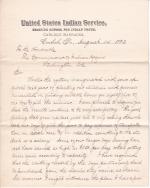
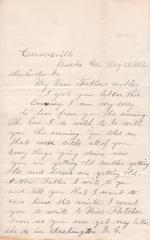
Se he du ba requests the return of his son Thomas Mitchell due to his age and the fact that he has been at the Carlisle Indian School for a year longer than his term of enrollment. Se he du ba also encloses a letter from Mitchell detailing his son's request to be returned home and his experience on outing.
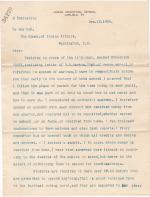
Richard Henry Pratt responds to an Office of Indian Affairs letter which enclosed a letter from W. B. Backus, Superintendent of the Genoa School, in reference to a system of savings for students. Pratt notes that he believes he fills the place of a parent for the students at the Carlisle Indian School, that he considered teaching students about…
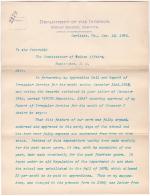
Captain Richard H. Pratt explains to the Commissioner of Indian Affairs the many benefits of paying student employees for their labor at the school and setting up savings accounts for each student. Pratt provides statistics on how much the school paid students and how many students were paid; he then compares to this to the amount that students…
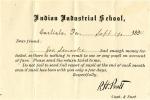
Signed request of Joseph Saunooke to participate in the outing program at the Carlisle Indian School along with a copy of the outing rules signed by Saunooke, Richard Henry Pratt, and William Balderston. Also included is a notice to Balderston from Richard Henry Pratt that Saunooke had enough money for the ticket so there is no need to pay for…
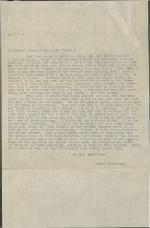
Ralph Armstrong writes to Richard Henry Pratt criticizing his outing patron for low payment and a high work load, and requesting a transfer.
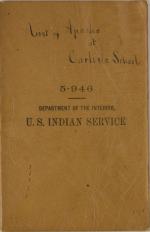
Correspondence regarding a request from Apache prisoners of war for the return of their children from the Carlisle Indian School. Included in the correspondence are various recommendations for the students as well as Richard Henry Pratt's philosophy in educating the Apache students and his views on interpreters.
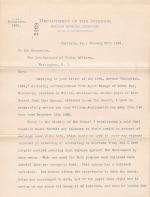
Richard Henry Pratt responds to an Office of Indian Affairs letter regarding a request by William Archiquette to receive the money he had on deposit at the Carlisle Indian School.
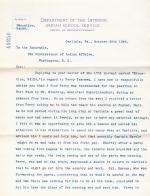
Richard Henry Pratt provides an long update on Perry Tsamanwa taking a position in the Indian Service.
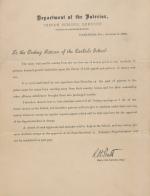
Richard Henry Pratt notifies outing patrons of a change in how outing earnings are to be handled. Pratt indicates that paying students directly has led to various offences and as a result all pay will be approved by Pratt. Further any money given to students is no longer considered part of their pay.
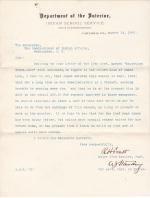
Alfred John Standing responds to an Office of Indian Affairs letter regarding the request to return James Lock to his home.
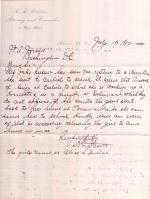
Richard Henry Pratt responds to the request of Mrs. Jake Reuben for the return of her daughter Alice Doctor. Reubens in particular objects to the outing program.
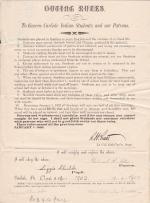
Richard Henry Pratt provides correspondence and documents related to a request to return Lizzie and Nancy Chubb to their home. Their father in particular objects to them being sent out to work on the outing program and notes that they are sick.
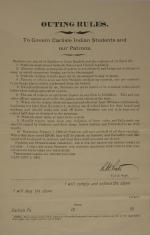
Correspondence regarding the request for the return on Maggie Venne. Also included are materials related to the outing system at the Carlisle Indian School.
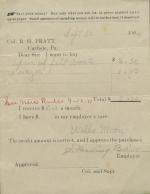
These materials include a copy of the Outing Rules that were signed on March 20, 1903 by William Moon and S. Reading Bodine. Also included are nine receipts to Bodine for salary paid to Moon as well as a request from Moon for funds to make purchase.
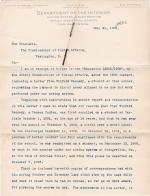
William A. Mercer replies to the request of Wilford Kennedy to have his money sent to him from his account at the Carlisle Indian School.
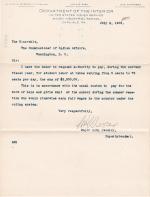
William A. Mercer requests authority to pay student labor over the summer in lieu of them earning wages over the summer on outing.
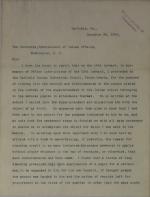
W. S. Olive, Special U.S. Indian Agent, reports on the personal student financial accounts at the Carlisle Indian School. Olive makes a number of recommendations to prevent further fraud.
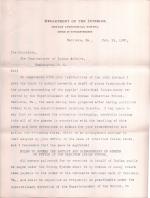
W. S. Olive, Special U.S. Indian Agent, submits proposed rules for overseeing the individual student financial accounts at the Carlisle Indian Schools.
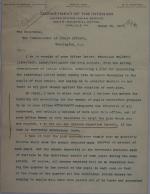
Correspondence related to the proposed set of rules for the oversight of individual student financial accounts at the Carlisle Indian School.
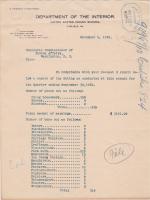
These materials contain a report detailing the number of students in the outing program, the types of trades they were engaged in, and the total amount of earnings, for the third quarter of 1910.
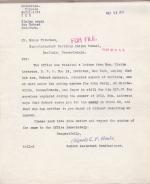
These materials include correspondence concerning outing wages due to Robert Anderson by John Neely of Morrisville, Pennsylvania.
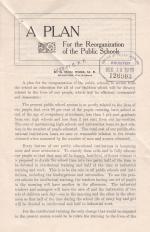
Commissioner of Indian Affairs Cato Sells writes a lengthy letter to G. McM. Ross in which he thoroughly disagrees with Ross' claim that Carlisle Indian School students should be paid for their labor, reasoning that the government pays for their lodging, food, and education, that students can earn money on outing, and that their labor at the…
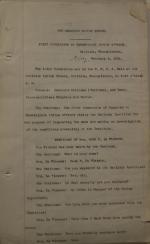
The typed transcript of Rosa B. La Flesche's testimony before the Joint Commission to Investigate Indian Affairs. At the time La Flesche worked at Carlisle as the Outing Manager, though she previously attended the school under the name Rosa Bourassa.
In her testimony La Flesche critiques Superintendent Friedman's administration in regards…
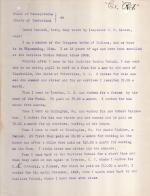
In this affidavit David Sowmick (here spelled David Sawmick) discusses the outings he went on as a student at Carlisle. He lists where he went, to whom he was sent, and the money paid for his labor. Since returning to the school he learns blacksmithing.
In Inspector Linnen's main report for the 1914 Congressional investigation at Carlisle…
